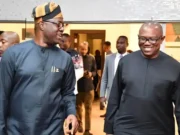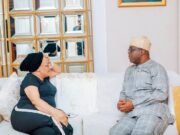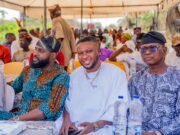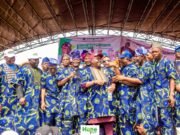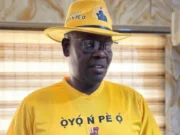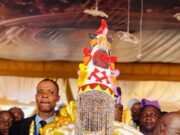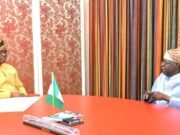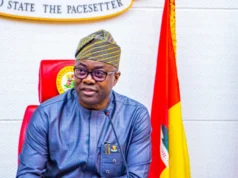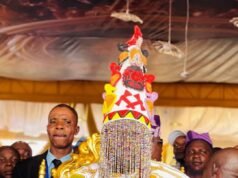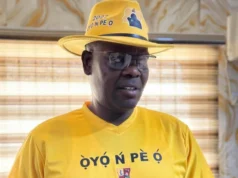Childhood dreams rank among the strongest influences on one’s future career path, and the story of Prof. Afis Ayinde Oladosu is another proof of this claim. His venture into Arabic and Islamic studies did not start ten or twenty years ago; it began during the Islamic scholar’s formative years when he learned about and fell in love with the dynamics of Arabic as a language and the tenets of Islam as an inviting religion. But how far can love and passion take people in the pursuit of their dreams and desires?
Prof. Oladosu’s passions helped him stand his ground through a Christian missionary high school, and they grew in leaps and bounds as he passed through tutelage at the Arabic Institute of Nigeria. Exposure to Islamic language, culture, history, peculiarities, and people further endeared the young Afis to the religion. During his years at the institute, he got the clearest vision of what he would love to become, what could make him fulfilled in the end. The Arabic and Islamic worlds have so much knowledge and wisdom to bequeath a curious and searching scholar, and Oladosu joined the league of such curious scholars. Deep-rooted study and academic sojourns at the University of Ibadan eventually led the scholar to find his path and purpose in the study of an academic triad: Arab-Islamism, Afrabism, and Contrapuntal Criticism. These three terms are not the result of a man’s toying with huge words but the products of a man’s toil in wide academic fields.
What is the relationship between Arabic as a language and Islam as a religion? Arab-Islamism is a three-dimensional academic field of study that explores the relationship between Arabic (Arab) as a language and culture and Islam as a religion; it explores the meeting point between both. Arabic is considered the language of Islam and the vehicle of communication within the Islamic religious world. However, is there more to these two concepts than the one being a communication vehicle within the circle of the other? Arab-Islamism as a field of study is three-forked–the Disaffiliation of Arab-Islamism, the Affiliation of Arab-Islamism, and the Filiation of Arab-Islamism. These are the three components of the first field of study on which Oladosu has spent the better part of his scholarly life.
What is the Disaffiliation of Arab-Islamism, and how does it come to play? Prof. Oladosu has a special interest in how people concern themselves with the study of Arabic and Islam. The non-Arabs and non-Africans have a peculiar and disengaged way of studying Arab-Islamism. They study it from a third-person and disaffiliated angle, studying the concept while disengaging themselves from the ideals of the religion and the culture of the people. These Arab-Islamism scholars portray themselves as adherents and proponents of the concept, while in real life, they study the concept out of pure human curiosity and not because of passion or belief in the religion.
Oladosu’s academic findings prove the disaffiliation of Arab-Islamism; how there are more non-Arab, non-Muslim scholars conducting deep studies of the Arab-Islamic world than there are Arab-Muslim or non-Arab Muslim scholars. He posits that most non-Muslim scholars in the Arab-Islamic field of study are there for the potential monetary gains that such an under-explored field offers. He further posits that one of the major factors causing this is the dependence of the Arab-Islamic world and its scholars on external non-Arab, non-Muslim scholars. On the one hand, is Arab-Islamism, while on the other, there are disengaged, spiritually disconnected scholars. If the disaffiliation of Arab-Islamism concerns spiritually unconnected scholars, what then is the affiliation of Arab-Islamism?
The affiliation of Arab-Islamism is a study of Arab-Islamism that transcends scholarly dealings and takes some steps further. It is a class of scholars who connect with the Arabic and Islamic world beyond being scholars. They are the ones who study these two concepts due to the undying love they have for Islamism and Arabic as a language. Affiliated scholars have viewed Arab-Islamism as a phenomenon bigger than they are, a phenomenon whose ideals they guard jealously. These affiliated scholars could be Muslims or Christians; however, one thing unites them–the study of Arabic and Islam for what they are and not for personal or monetary gains.
The Arabs’ presence in colonial Africa preceded that of the Europeans, and it is faulty and untrue to claim that Africa had no civilization before the coming of the Europeans. If the Arabs were in Africa, and if there is a standard Arabic system of numbering and lettering, a system introduced in Africa before the coming of the Europeans, then there must have been written history about Africa that are older than the warped documentaries of the Europeans. This is the belief of Oladosu and other Arabic and Islamic scholars who see the study of Arab-Islamism beyond their wants or gains; something that could be beneficial to Africa in getting the history of the continent straight and rewriting the story as it should be. These scholars are the affiliated Arab-Islamic scholars.
Oladosu’s chief interest and specialization have been in the filiation of Arab-Islamism. Although the scholar has devoted quality time to studying the disaffiliation and affiliation of Arab-Islamism, his mainstay has been in the third tier of the first path of his triadic academic sojourn. Filiated Arabic scholars seem to be the mid-point between the disaffiliated and affiliated Arabic scholars. The filiation of Arab-Islamism is a league that believes in the ardent study of Arab-Islamism without jettisoning personal values and pursuits. The proponents of this concept believe that one can mingle personal beliefs and traditional culture and values with the study of Arabic and the Islamic religion.
Prof. Oladosu is a solution-seeking scholar. He is not of the rank of those who study just for the sake of acquiring knowledge without putting such knowledge to use for the betterment of society. In his works on Arab-Islamism, the scholar analyzed the writings of Arab-Islamic scholars from North Africa, the challenges they faced and still face, the problems militating against the teaching and learning of Arabic in Nigeria, the low rate of production of scholarly Arabic works by Nigerians, and how Arabic as a language and Islam as a religion influence Arab-African relations. In a less-explored field such as the study of the Arabic literary works of North Africa, Oladosu pioneered the examination of the cultural productions in Egypt and Sudan across histories, bringing to the fore the cultural and intellectual contributions of Sudanese writers to the African heritage. He has equally done beautiful works on gender representation and the politics of being in North African literature, especially the knowledge one gender has of the other. Identity, Self, and Knowledge of the Other are much-explored themes in North-African Arabic literature, reflecting the beliefs of their society.
Moreso, Oladosu’s contributions to the field of Arabic learning are not limited to examining and analyzing the problems confronting learners and stakeholders. He has also written works of literature to aid the learning of the language. In the course of his research, Oladosu discovered that the consideration of Arabic as a gauge for one’s level of spirituality had limited the proficiency rate of learners. Learners of the language who do not seek to be Islamic scholars or religious leaders see no reason to become proficient in the language. To stimulate interest in the language and encourage its learning, Oladosu wrote poetry anthologies which examination bodies have adopted as study texts for senior secondary school students. Oladosu’s Did My Parent’s Sin Against Me? is a poem from one of his anthologies that does not only stimulate interest in Arabic but also sparks philosophical and thought-evoking questions whose answers could be found in the Quran, thereby leading readers to loving, studying, and finding their answers from the Holy Book. Oladosu’s works expanded to the effects of globalization on the self-awareness and identities of the Muslim youth, university education in the Islamic tradition, corruption in Islamic hermeneutics, Islamic missionary activities in a postmodern age, and the challenges facing Christian-Muslim relations in Nigeria. His Islamic studies and research tilt towards discovering problems and proposing solutions to better our society and country.
Furthermore, his intellectual tentacles are so far-reaching, they have coiled around the study of Afrabism. Afrabism seeks the positive connections between the histories, beliefs, peoples, and cultures of Arabism and Africanism. It is a counter-affront on Afrontalism and Arabontanlism—one being a school of thought that sees anything African and non-Arab as substandard and ancient; the other, a school of thought that sees the Arab world as below par and dysfunctional. Afrabism seeks to convince Arab Africa and Black Africa that the unity of these two sub-continents, that the unity of Africa is capable of catapulting the continent to accelerated advancement and development.
Oladosu’s studies of contrapuntal analysis and reflection have led him to discover that the average Muslim is constantly faced with challenges that make them ask the question, “Is it because I am a Muslim?” The bombing of the Twin Towers in 2001, the world’s descension on seemingly Islamic terrorists, and the resulting profiling of and extra-carefulness with the average Muslim led to the stage of contrapuntal analysis of self-reflection that Muslims experience. The world profiles the average Muslim, which is why any seemingly adverse decision made against a Muslim is first met with the question, “Is it because I am a Muslim?” He invites us to ponder and logically consider experiences and instances to find out if it is truly because the seeming victim is a Muslim or if there are always or, more often than not, other reasons for the decisions taken.
Prof. Oladosu continues to do enviable and commendable work in Arabic and Islamic studies. He is expanding study paths and charting new courses. He is one of the best minds Nigeria has in Arabic and Islamic studies, and his studies are geared towards national development and true change.



